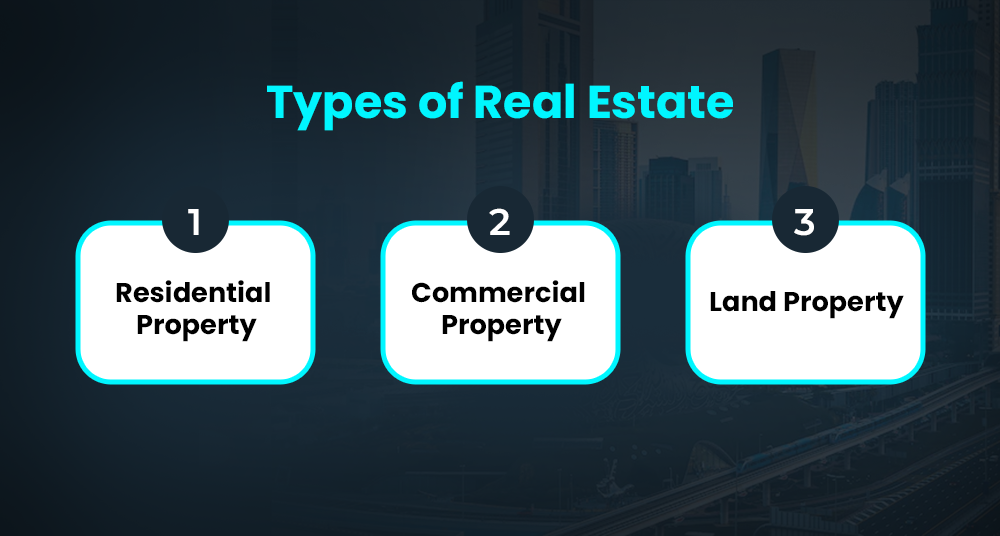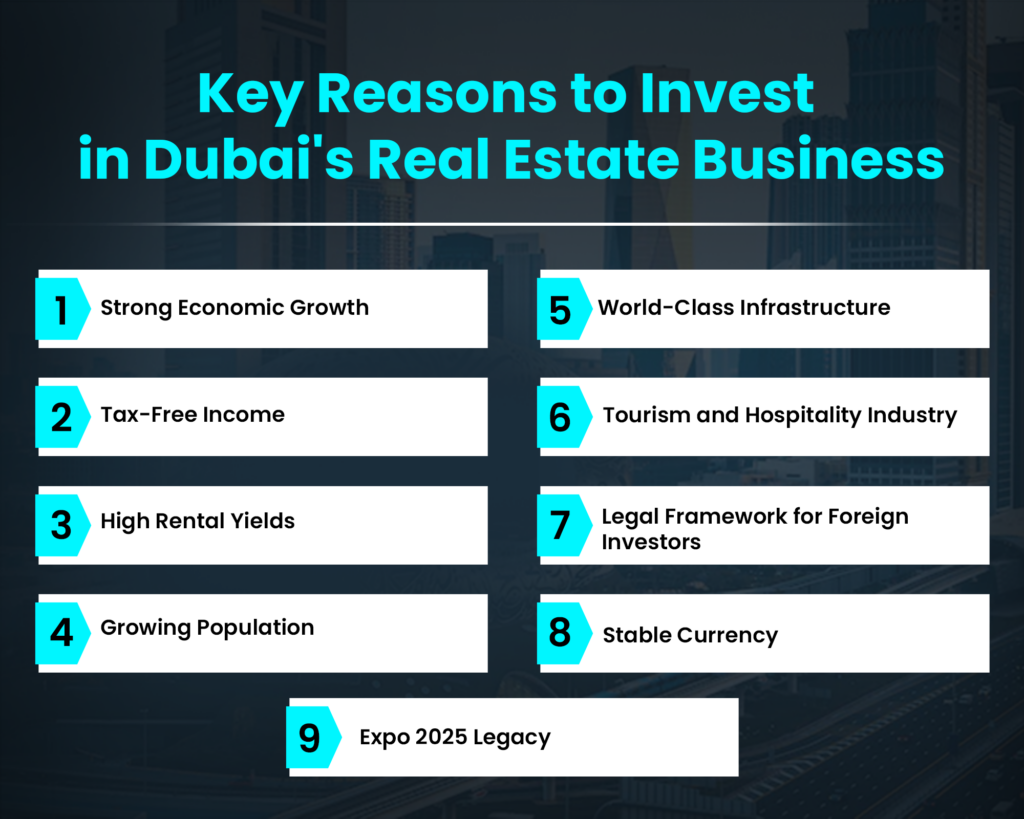Starting your own real estate business in Dubai presents an exciting opportunity to become a successful entrepreneur. Known for its luxury lifestyle, iconic monuments, and booming tourism, Dubai’s real estate market is one of the most lucrative in the world. According to a report by Statista, the residential real estate segment is expected to reach a market volume of US$400 billion, with a steady annual growth rate of 2.45% projected from 2025 to 2029, pushing the market volume to US$760 billion by 2029.
With such impressive growth, it’s clear that Dubai’s real estate sector holds enormous potential. Ready to JOIN the CLUB of successful real estate entrepreneurs? This guide will take you through everything you need to know to start your real estate business from scratch.
All About Dubai: Most Famous City in UAE
Dubai, the most famous city in the United Arab Emirates (UAE), is a global hub for business, tourism, real estate, and luxury living. Known for its cutting-edge architecture, extravagant shopping malls, and dynamic lifestyle, Dubai attracts millions of visitors each year.
#1. Iconic Landmarks
The city is home to some of the world’s most iconic landmarks, including the towering Burj Khalifa, the tallest building on Earth, and the luxurious Burj Al Arab hotel. Dubai’s skyline is a testament to its rapid growth, blending modern skyscrapers with innovative designs. One of the city’s most famous attractions, Palm Jumeirah, is a man-made island shaped like a palm tree, offering luxury resorts and stunning waterfront views.
#2. Shopping and Luxury
Dubai is also a shopping paradise, with malls like The Dubai Mall, which houses over 1,200 shops, an aquarium, and an ice rink. The city is renowned for its tax-free shopping, attracting shoppers from all over the world. Dubai’s vibrant nightlife, world-class restaurants, and entertainment options make it a sought-after destination for tourists.
#3. Cultural Heritage
Beyond its modern appeal, Dubai has preserved its cultural heritage, with attractions like the Dubai Museum and traditional souks (markets) offering a glimpse into the city’s rich history.
#4. Transportation
The city’s public transportation system, including the Dubai Metro, taxis, and water taxis, makes getting around easy and convenient.
With its year-round sunny weather and a thriving economy, Dubai continues to be a symbol of luxury, innovation, and progress in the Middle East.
Introduction to Real Estate Business
A real estate business involves buying, selling, renting, and managing properties such as land, buildings, flats, and homes. These companies may also engage in construction, renovation, and property development. They serve as intermediaries between buyers and sellers, helping clients find suitable properties while offering services like property management and investment advice.
Types of Real Estate

1. Residential Property
Single-Family Homes: Independent houses designed for one family, offering privacy and space.
Apartments: Multi-unit buildings where individual units are leased or owned.
Villas: Luxurious, standalone homes often with private gardens and amenities.
Townhouses: Multi-floor homes that share walls with adjacent units, typically in urban areas.
2. Commercial Property
Office Buildings: Properties used for business operations, ranging from small offices to large corporate headquarters.
Retail Spaces: Properties designed for retail businesses, such as stores, showrooms, and shopping malls.
Industrial Properties: Buildings used for manufacturing, warehouses, and distribution centers.
Hotels and Hospitality: Properties used for accommodation services, including hotels, resorts, and motels.
3. Land Property
Raw Land: Undeveloped land that can be used for future development or investment.
Agricultural Land: Land used for farming, including crops, livestock, or forestry.
Commercial Land: Land zoned for commercial development, such as office buildings, retail spaces, or industrial facilities.
Residential Land: Land designated for residential development, where homes or apartments can be built.
10 Reasons: Why Should You Invest in Dubai’s Real Estate Market?

Strong Economic Growth
Dubai’s economy has been steadily growing, driven by sectors such as tourism, trade, finance, and real estate. The city’s strategic location between Asia, Europe, and Africa makes it a global business hub, providing a solid foundation for long-term investment.
Tax-Free Income
One of the major attractions for investors in Dubai is the absence of income tax, capital gains tax, and property tax. This allows investors to keep more of their profits, making it an ideal place for both short-term and long-term investments.
High Rental Yields
Dubai offers some of the highest rental yields in the world, with rates ranging between 5% to 9% annually. This makes it an attractive destination for investors looking to generate passive income through rental properties.
Growing Population
Dubai’s population continues to grow, driven by its thriving economy, job opportunities, and high standard of living. This population growth increases demand for housing, commercial properties, and retail spaces, ensuring a strong real estate market.
World-Class Infrastructure
Dubai is known for its cutting-edge infrastructure, including the world’s tallest building, the Burj Khalifa, and its extensive transportation networks. The city’s continuous development ensures that real estate investments remain in demand.
Tourism and Hospitality Industry
Dubai is one of the world’s most popular tourist destinations, attracting millions of visitors each year. This drives demand for short-term rental properties, hotels, and vacation homes, offering investors lucrative opportunities.
Legal Framework for Foreign Investors
Dubai’s real estate market is open to foreign investors, with clear regulations and property ownership laws that make it easy to buy and sell property.
Stable Currency
The UAE Dirham (AED) is pegged to the US Dollar, providing stability and reducing currency risk for international investors.
Expo 2025 Legacy
The upcoming Expo 2025, set to take place in Dubai from February 21–22, is expected to have a significant impact on the city’s real estate market. Similar to the success of Expo 2020, the event will drive further infrastructure development, enhance Dubai’s global reputation, and attract millions of visitors from around the world. This boost in tourism and international attention will lead to increased demand for both residential and commercial real estate, creating lucrative investment opportunities. The legacy of Expo 2025 will likely continue to shape Dubai’s urban landscape, ensuring long-term growth and profitability in the real estate sector.
Key Players in the Dubai’s Real Estate Industry
- Emaar Properties
- DAMAC Properties
- Nakheel
- Sobha Realty
- Danube Properties
Legal Key Consideration Before Starting a Real Estate Business in Dubai
Business Licensing and Registration
Before starting a real estate business in Dubai, you must obtain the appropriate licenses from the Department of Economic Development (DED) or relevant free zones. A real estate license is mandatory, and businesses must be registered with the Real Estate Regulatory Agency (RERA), which is part of the Dubai Land Department (DLD).
Legal Structure of the Business
Choose the right legal structure for your real estate business. Options include a sole proprietorship, limited liability company (LLC), or a partnership. The structure you select will affect ownership, liability, and tax obligations.
Foreign Ownership Laws
Dubai allows foreign ownership of real estate businesses, but there are restrictions in certain areas. Foreigners can own 100% of their business in designated free zones, but outside these zones, the ownership may require a local partner or sponsor holding at least 51% of the business.
Real Estate Regulatory Compliance
Compliance with RERA’s rules and regulations is essential. RERA oversees real estate activities, ensuring transparency and protecting the interests of both buyers and sellers. You must adhere to RERA’s guidelines on property transactions, advertising, and documentation.
Real Estate Agent Licensing
If your business involves acting as a real estate agent, you must ensure that all agents are licensed by RERA. Agents must pass the RERA exam and register with the agency to operate legally in Dubai.
Property Ownership Regulations
Understand the laws governing property ownership in Dubai. While foreigners can buy property in designated freehold areas, there are specific guidelines about the types of properties available for foreign ownership and the maximum percentage of property ownership allowed in certain developments.
Taxation and VAT
Dubai is known for its tax advantages, but it’s essential to understand the VAT (Value Added Tax) implications on property transactions. Real estate businesses must comply with VAT regulations, especially on sales, leases, and rentals of commercial properties.
Real Estate Contracts and Documentation
Ensure that all contracts, whether for buying, selling, leasing, or renting properties, comply with Dubai’s legal standards. Contracts must be written in Arabic and signed by both parties to be legally binding. It is advisable to seek legal advice to ensure that all documentation is correct and enforceable.
Landlord-Tenant Laws
Familiarize yourself with Dubai’s landlord-tenant laws, which govern rental agreements, eviction procedures, and tenant rights. The Real Estate Regulatory Agency (RERA) provides a standard rental contract that must be used for all rental agreements.
Dispute Resolution
In case of disputes, Dubai offers various legal avenues for resolution. The Dubai Rental Disputes Center (RDC) handles property-related disputes, while the Dubai International Financial Centre (DIFC) courts offer a platform for resolving commercial disputes.
Key Strategies for Leading the Real Estate Business in Dubai

Build a Professional Website: Make sure your website is user-friendly, showcases property listings, and includes contact details and lead capture forms.
Use social media: Post regularly on platforms like Instagram, Facebook, and LinkedIn to showcase properties and engage with potential clients.
Run Paid Ads: Use Google Ads and social media ads to target specific audiences looking for real estate in Dubai.
Email Marketing: Collect email addresses and send regular newsletters with new listings, market updates, and special offers.
Create Engaging Content: Write blogs, create videos, and share market insights to establish your business as an expert in the Dubai real estate market.
Network with Industry Professionals: Build relationships with property developers, agents, and other real estate professionals to expand your network.
Offer Referral Programs: Encourage existing clients to refer others by offering incentives or discounts.
Encourage Reviews: Ask satisfied clients to leave reviews on Google and social media to build credibility and trust.
Attend Real Estate Events: Participate in expos and conferences to connect with potential clients and partners.
Track and Improve: Use analytics tools to track your marketing efforts and adjust strategies based on performance data.
Launch Your Real Estate Business in Dubai with SYNARION IT
Launch your real estate business in Dubai with SYNARION IT Solutions, a leading website development company in Dubai. With expertise in creating innovative, user-friendly websites, we help businesses in the real estate sector build a strong online presence. Our team provides tailored solutions for your business needs, ensuring seamless property listings, client management, and digital marketing strategies to help you thrive in Dubai’s competitive real estate market.
Related Guide: Top Website Development Companies in Dubai
Summary
Starting a real estate business in Dubai offers significant potential due to the city’s thriving economy, booming tourism, and luxury lifestyle. Dubai’s real estate market includes residential, commercial, and land properties, with high rental yields and tax-free income attracting investors. Key steps to success include obtaining the proper business licenses, complying with regulations, and understanding ownership laws. Dubai’s upcoming Expo 2025 is expected to further boost the market, creating lucrative investment opportunities. To lead in this competitive market, effective strategies include building an online presence, using social media, networking, and offering referral programs.






What do you think?
It is nice to know your opinion. Leave a comment.